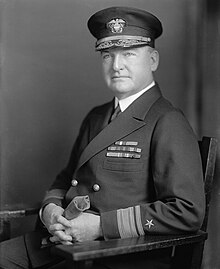Luke McNamee
| Luke McNamee | |
|---|---|
 |
|
| 21st President of the Naval War College | |
|
In office June 3, 1933 – May 29, 1934 |
|
| Preceded by | Harris Laning |
| Succeeded by | Edward C. Kalbfus |
| 21st Director of the Office of Naval Intelligence | |
|
In office September 1921 – November 1923 |
|
| Preceded by | Andrew T. Long |
| Succeeded by | Henry Hughes Hough |
| 12th Naval Governor of Guam | |
|
In office October 3, 1907 – December 28, 1907 |
|
| Preceded by | Templin Potts |
| Succeeded by | Edward John Dorn |
| 10th Naval Governor of Guam | |
|
In office November 2, 1905 – December 3, 1906 |
|
| Preceded by | George Leland Dyer |
| Succeeded by | Templin Potts |
| Personal details | |
| Born |
August 4, 1871 Mount Hope, Wisconsin |
| Died | December 30, 1952 (aged 81) Newport, Rhode Island |
| Nationality |
|
| Awards |
Navy Cross Legion of Honour |
| Military service | |
| Allegiance |
|
| Service/branch |
|
| Rank |
|
| Commands | |
Luke McNamee (April 4, 1871 – December 30, 1952) was a United States Navy Admiral, businessman, and the 10th and 12th Naval Governor of Guam. He served in the Navy for 42 years, during which time he held multiple commands. During the Spanish–American War, he earned the Navy Cross, and later the Legion of Honour. Earlier on his career, he served as governor, and expanded funding for fighting the infectious diseases running through the native population. He represented the U.S. Navy as a delegate to the Paris Peace Conference in 1919. He later became Director of the Office of Naval Intelligence. He was promoted to full admiral after being placed in charge of the Battle Fleet. After this command, he served as President of the Naval War College before retiring in 1934. After leaving the Navy, he became President and Chairman of the Mackay Radio and Telegraph Company, where he aggressively expanded telegraph and radio service overseas.
McNamee was married to Dorothy Swinburne, daughter of Admiral William T. Swinburne, with whom he had no children. For much of his life, he lived in Wisconsin, though he later moved to Jamestown, Rhode Island.
McNamee had a 42-year career in the United States Navy. He was appointed to the United States Naval Academy from Kansas, graduating in 1892. He was commissioned as an ensign on July 1, 1894. He served two years aboard the training ship USS Atlanta before being transferred to the USS Essex, where he served from 1894 to 1898. He became a lieutenant junior grade on March 3, 1899 and a lieutenant on July 1, 1900. He served as executive officer of the USS Princeton during the Spanish–American War. In 1901, he served aboard the battleship USS Oregon. From 1905 to 1908, he was assigned to the Guam Naval Station, after which he served as the naval inspector to General Electric works in Schenectady, New York and Massachusetts and the navigator of the USS Nevada. After serving as the first commanding officer of the USS Sacramento, he was promoted to Captain in 1917. While on the Sacramento, he commanded all Navy forces in the Gulf of Mexico, though this only consisted seven gunboats. After his promotion, he served as chief of staff to the commander of the United States Pacific Fleet, and then to Admiral William Sims, commander of United States Naval forces in Europe. In 1919, he was on the naval advisory board at the Paris Peace Conference.
...
Wikipedia
